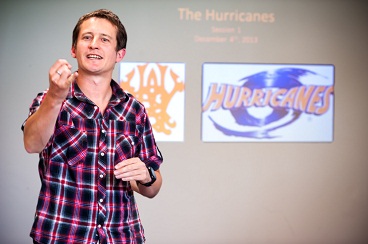Sports players and post-match interviews
Congratulations to Kieran File to be awarded a PhD in Applied Linguistics.
A Victoria University of Wellington PhD graduate is turning his research expertise into a consulting business, helping professional sports players perform confidently in after-match media interviews.

Kieran File, who graduates with a PhD in Applied Linguistics this week, has identified patterns in the language used by players and interviewers in post-match interviews, and studied the reasons these have developed.
An avid sports fan and English language teacher by trade, Kieran started collecting material for his topic in 2002 before combining his passions and embarking on a PhD in 2009.
Kieran says despite post-match interviews having a reputation for being repetitive and clichéd, they are incredibly difficult to do.
Variables such as the type of sport, region, result of the match and player’s experience level, as well as subtle features of the specific context and goals of each interview, have a considerable effect on the player’s linguistic choices.
"Individual sports players spoke more strongly, and seemed freer to evaluate their own performance and the performances of others. The variable of being a team player really constrained what players felt comfortable saying," he says.
He identified a pattern of winners downplaying the victory, particularly when it wasn’t the final interview of the tournament. Losers would almost do the opposite, acknowledging the loss and talking up positives or things they need to work on.
"Media has become an important component of sports players' professional lives. The consultancy work I've been doing has been designed to get younger players more aware of post-match interviews and what they're going to encounter, which also benefits the fans who get to know the players better," he says.
Kieran’s business, Reactive Sports Media, launched earlier this year and has already gained positive feedback from the Wellington Lions and Hurricanes rugby teams.
Steve Symonds, Hurricanes Professional Development Manager, says Kieran provides evidence that resonates with the team and allows players to use their strengths to effectively manage media.
"Being confronted by cameras after a match can be an uncomfortable experience for players. Kieran provides strategies, as well as the opportunity for the players to put them into practice," he says.
Kieran says the findings from his PhD have been crucial in directing the training programme. "The research allowed me to develop tools to help players make informed decisions when communicating in the media."
